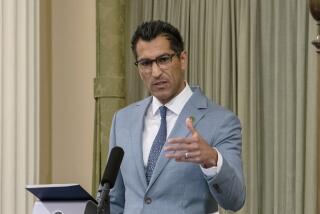When Compromise Can Be a Capitol Gain : Bush would be right to abandon ideology and cut a tax deal
In this summer of economic uncertainties--and growing political discontent--Washington appears to be moving with some resolve to draft a bipartisan tax bill that might escape the political quagmire that usually bogs down the annual process. Of course, it’s an election year, and politicians are above all else political. But both Republicans and Democrats recognize that fiscal measures are needed to quell consumer jitters and provide incentives for investment and other spending. The best sort of kick-start for the moribund economy could come from passage of a tax bill--especially if both sides can keep their political daggers sheathed during the process.
The Senate Finance Committee last week cleared a tax bill that includes a little something for everyone: investment incentives for business, tax credits for consumers, aid for blighted urban and rural areas and provisions for some special interests. The measure, which could go to the Senate this week, includes most of President Bush’s key economic initiatives--except for his long-sought cut in the capital gains tax.
LOSING STAND: So far the Administration appears to be acquiescing to the omission, but already the President is under pressure from some Republicans, especially Housing Secretary Jack Kemp, to insist on the inclusion of a capital gains tax cut. The President should hold firm in trying to avoid a big, messy standoff, something that has become a political fact of life over the last three years.
Retooling the capital gains tax is not an idea that should be abandoned forever. Even Democratic presidential contender Bill Clinton has included proposals to reduce the capital gains tax in his economic plan.
But as we head into the heat of the November election, no one can be clear headed enough to fashion a thoughtful capital gains tax that would provide incentives for productive, job-generating enterprises rather than fast, make-a-buck paper deals.
WINNING HAND: Disenfranchised voters right now are looking for growth and stability. Economic growth slowed to a snail’s pace in the second quarter; consumer confidence is plummeting again, reversing a short-lived spurt of optimism. A combination of Democratic and Republican measures would help stimulate the economy, which is now threatened by the possibility of a triple-dip recession.
The Senate bill includes, among other things, a one-year 15% investment tax allowance for equipment installed before next July; a tax credit of as much as $2,500 for first-time home buyers who purchase by the end of the year and restoration for everyone of a full $2,000 tax deduction for contributions of a like amount to individual retirement accounts.
If passed, the Senate bill will have to be combined with a House measure that does not include any of the Administration’s initiatives. There must be compromise here, too. The goal should be to clear a tax bill through both houses before Congress recesses for the summer.
Cynics might say this would give the President a victory before he heads for the Republican convention. Democrats, meanwhile, would be able to undercut Bush’s claims that the Democratic-controlled Congress has thwarted his economic proposals. But a tax bill is about national interest: the big picture.
More to Read
Get the L.A. Times Politics newsletter
Deeply reported insights into legislation, politics and policy from Sacramento, Washington and beyond. In your inbox three times per week.
You may occasionally receive promotional content from the Los Angeles Times.










